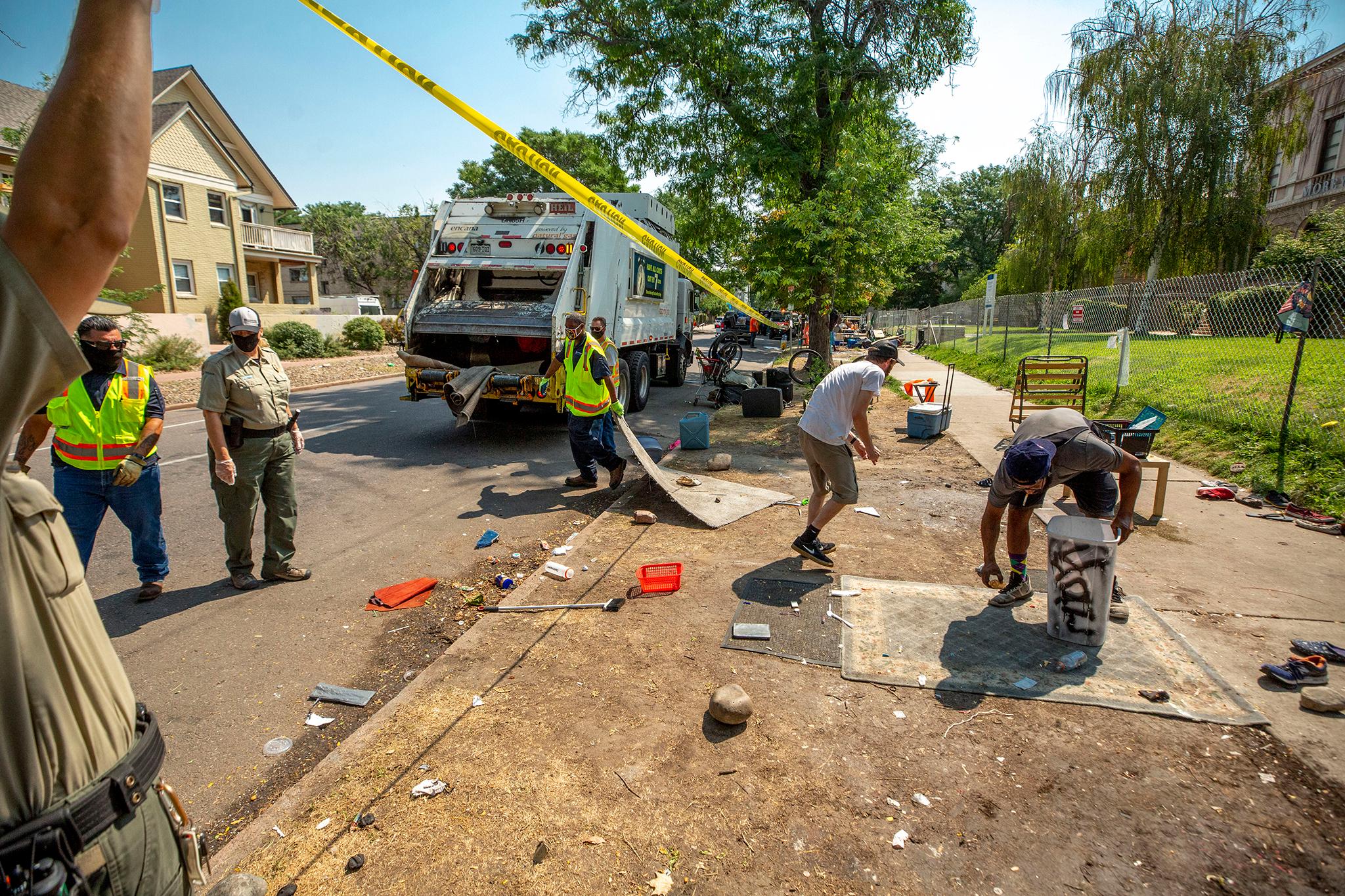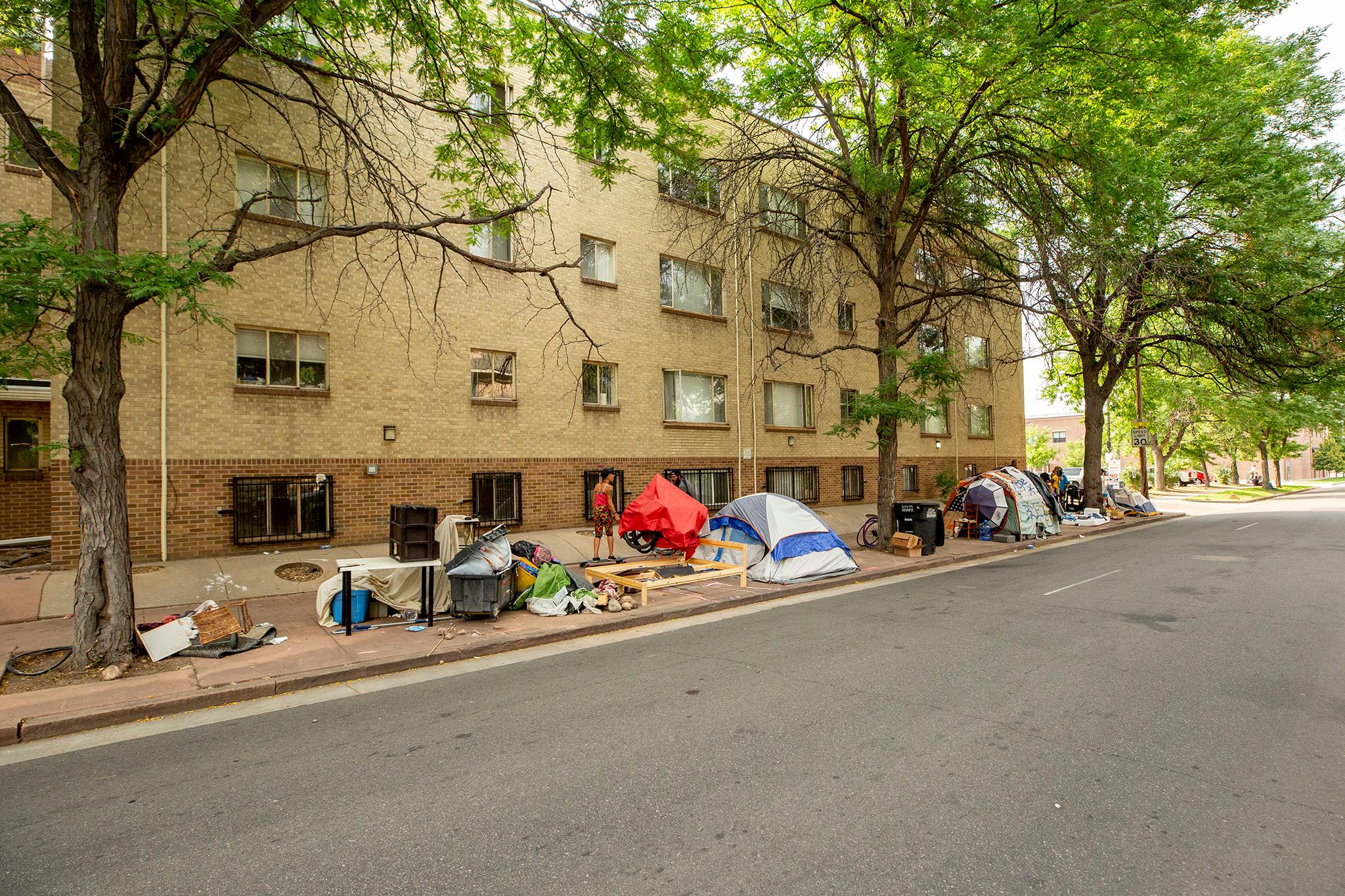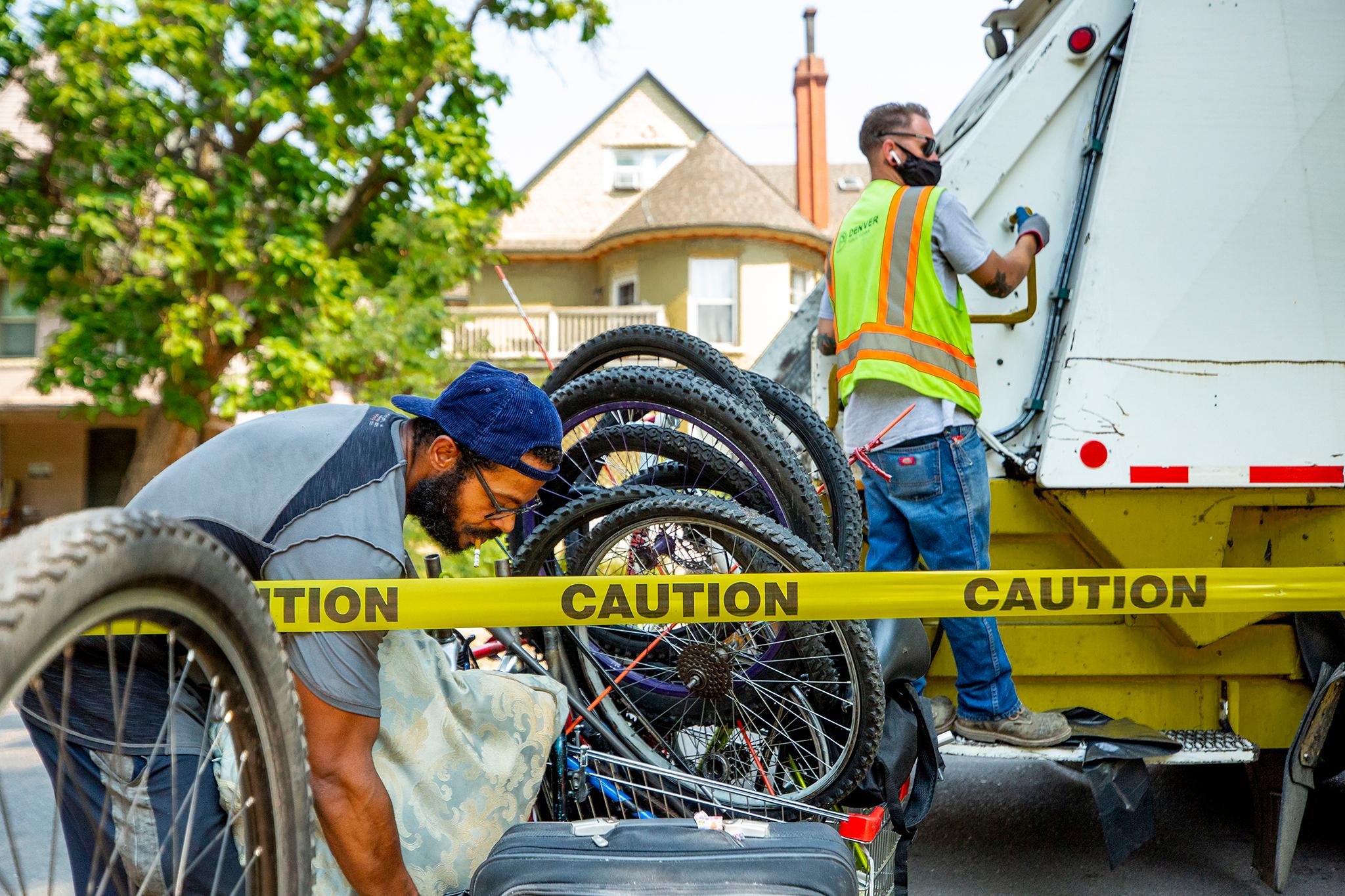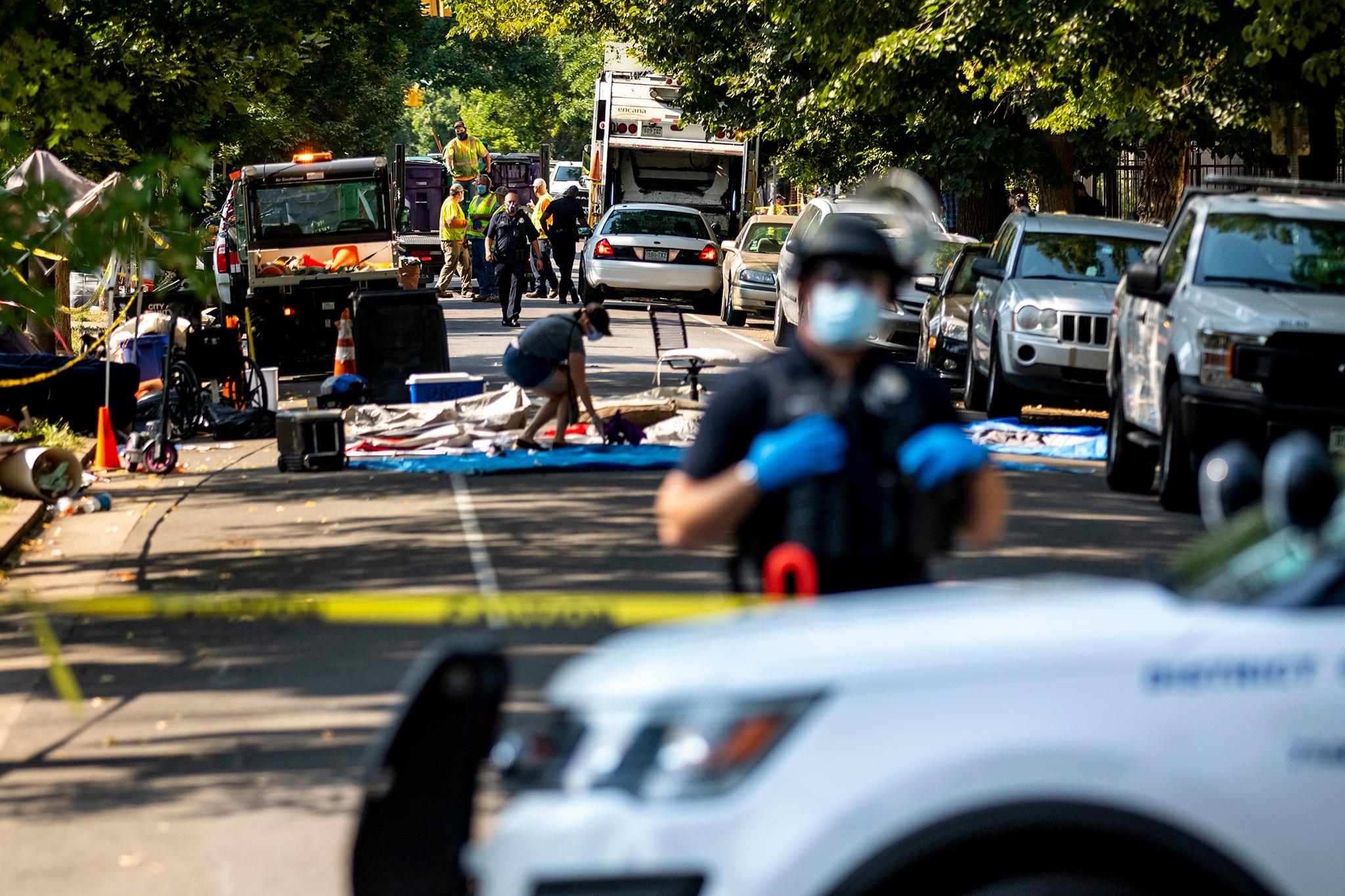Sanitation and health department workers, police, and school security officers and park rangers arrived with the sun Wednesday morning at an encampment around a Capitol Hill middle school.
People experiencing homelessness had known for weeks they would have to move soon from the sidewalks and strips of lawn along the streets outside Morey Middle School. While Denver Public Schools students will be learning remotely, teachers will be operating from classrooms, and school registration will happen in person later this week.
City workers and service providers have been visiting the camp, including, Monday to help residents collect their belongings and connect them to services.
As city workers cleaned the encampment Wednesday, Pedro Galivan pushed a shopping cart full of his belongings that included an American flag west along 14th Avenue.
"I'm not feeling too good today," Galivan said, adding he was unsure where he would set up camp next.
Danica Lee, director of the inspections division of the city's public health department, said her team inspected the area Tuesday afternoon and found trash, discarded syringes and "conditions that are not safe for anybody."
Signs posted at the site Wednesday warned of "pests, litter, human feces and urine, biohazards, rotten food and trash accumulation."
Residents of nearby apartments and condominiums have been complaining about conditions around Morey for months. On July 29, James Reynolds formed a non-profit organization, the Morey Residents Coalition Corp., to draw attention to neighbors' concerns.
"It just didn't seem like we were getting any answers on how things were going to be addressed," Reynolds said.
Wednesday, he said he was happy to "see that the city has responded and is handling it the way it has done," he said, noting the outreach that preceded the cleanup.

Reynolds had launched a GoFundMe campaign with the goal of raising $5,000 to hire an attorney to advise neighbors on what legal steps they could take. The campaign is more than halfway toward its goal. Reynolds said it was still to be determined how the organization would operate now that the camp had been dispersed for the cleanup, but that he still believed legal advice was necessary.
Homelessness "feels like something the community needs to organize and prepare to deal with in the future," Reynolds said.
"I think that the encampment has opened the eyes of the community to the issues faced by those experiencing homelessness," he added.
The advocacy group Denver Homeless Out Loud had put out a call on social media for people to come to Morey Wednesday morning to "stand up for housing, not sweeps."
The cleanup started earlier than such operations have done in the past and was underway by the time people who responded to the Denver Homeless Out Loud call arrived.
During a cleanup last week of an encampment in Lincoln Memorial Park near the state Capitol, officers forcefully detained a protester. At another point during the cleanup at Lincoln Memorial Park, Denver school board member Tay Anderson, who was at Morey Wednesday and Monday, was injured when he visited the site to urge that people be given more time to gather their property. Video taken at the scene appears to show Denver police officers shoving Anderson before he fell. Anderson said doctors diagnosed him with a concussion.
Organizations that support people experiencing homelessness had criticized the Lincoln Memorial Park cleanup. Mayor Michael Hancock, meanwhile, has expressed frustration about the presence of protesters at such operations.
Chris Conner, homelessness resolution director with Denver's housing department, joined in the outreach at Morey on Monday. Conner said security concerns had complicated outreach at Lincoln Memorial Park.
Derek Woodbury, spokesman for the city's housing department, said in recent weeks 19 people who had been camping at Morey were placed into hotel rooms that the city and its partners have secured for people experiencing homelessness who are affected by the pandemic. In addition, Woodbury said, outreach workers were able to reunite five people with relatives and one person was moved into an apartment from Morey.
Public health experts say breaking up encampments during a pandemic can make it hard for people experiencing homelessness to stay connected to services and could make it hard to control the spread of COVID-19. Denver officials say they have to weigh a variety of health concerns, including outbreaks of other diseases such as hepatitis A.
Woodbury said outreach to people on the streets would continue.
"Sustained relationships that lead to housing are a priority," Woodbury said. "Outreach workers are intentional to maintain connection through all the challenges of street homelessness."

Many people moved from the sidewalks around Morey to sidewalks elsewhere.
Tuesday, Antoinette Medina asked workers to take her belongings to a free storage site set up by the city. She said she wanted to keep her things safe. To keep herself safe, she said, she would "stay up all night walking around until the daylight shows up."
Medina said shelters were too crowded and she worried about falling ill in one. She said mental health struggles had contributed to her difficulty finding stable housing for years. She has been on a wait list for housing since September.
About 30 people were camping at the site when Wednesday's cleanup began. At one point, more than 100 people were living there.
A few hours after the cleanup began, Marcio Johnson stood behind a line of yellow police tape as he packed bicycle parts into a cart.
"As soon as the sun cracked, they were here," Johnson said of the city crews. "They told us that they were here to help."

Johnson said that outreach workers from the Denver Dream Center, which helps men who have been incarcerated reintegrate into communities, had visited him last week at Morey. He said that he was considering setting up camp near the nonprofit's offices in Sunnyside. He has been collecting parts he finds to build bikes, a skill he said he could use to help others at Denver Dream Center.
"Some of those guys would need bikes and transportation," Johnson said, saying he has been giving away and selling his bikes.
The 41-year-old Johnson said he had been living outside Morey, where he was once a student, for a month. He has been without a home since 2017.
A home would be "nice and all. A place to stay, a place to live. Safety and security," Johnson said. Then, tearing up, he said he put finding a way to help people ahead of finding a home.













